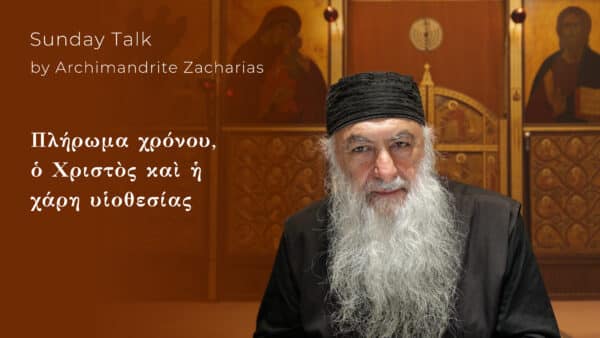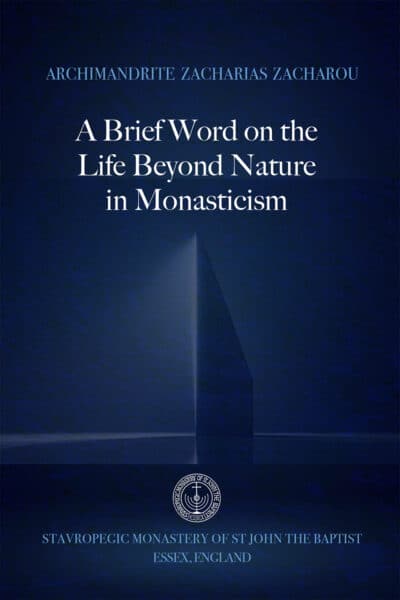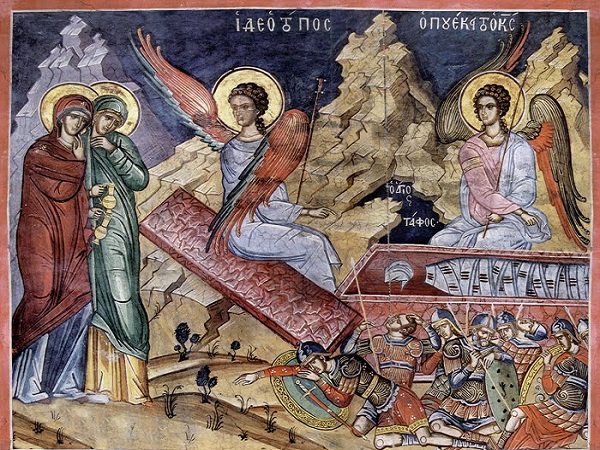In the person of St Mary of Egypt, whom we feast today, we can clearly discern the fact that whosoever embraces the Cross of Christ, finds healing and is led into a supernatural transformation of his existence, in which the indestructible power of the Gospel is triumphant. Since a tender age, St Mary wallowed in the mire of sin. However, by divine Providence and with the succour of the Mother of God, she ‘came to herself’. Obeying with gratitude the counsel of the Holy Virgin, she withdrew into the desert, where for more than forty years, she lived with inconsolable and fierce repentance, battling courageously against her fallen nature, her sinful habits and the merciless malice of the demons. The saint was discovered by St Zosimas, who became a monk at a very young age, out of love for God, and had reached great spiritual heights. However, a very dangerous thought began to appear in his mind: ‘Is there anyone upon earth, who can teach me something new in the spiritual life?’
St Zosimas and St Mary had begun their journey towards God from diametrically opposite points, but in the course of their life, they both received a new birth from above. Those born again of the Spirit are the living fulfilment of the word of the apostle, who teaches that it is the other who has importance, not ourselves, and exhorts Christians to honour their brother in lowliness of mind, ‘each esteeming the other better than themselves’.1Phil. 2:3-4. Men in the world are inspired by ambition to advance in their endeavours. They seek to improve their social standing, superiority, economic prosperity, recognition. However, while ambition makes man industrious and resourceful, it becomes a cause of discord and division with God, because it is the result of pride, and with men, because it makes love grow cold. The Lord describes the pursuit of power and thrones as idolatry.2Mark 10:43-44.
Christ does not abolish the passion of ambition, but He transforms it into a godly passion, an ambition to humble oneself and serve one’s neighbour. He reveals the ‘exceedingly noble path’ that grants wisdom to its disciple to put himself under every creature, not just by some unhealthy pretence of humility, but knowing, that if he follows the path of self-emptying, which Christ first walked, and remains united with Him, ‘the whole content of divine-human Being will be given to him imprescriptibly. Those who are bearers of the ethos of Christ, have a godly competition: who will humble themselves more before others, who will minister more selflessly to others. Moreover, they consider themselves totally unworthy of this work. This is precisely the rivalry we see in the meeting of St Zosimas and St Mary, and this is what makes it prophetic. St Mary was the bearer of a greater gift of the Holy Spirit, but Abba Zosimas was also great, because he discerned it, respected it and even though he was a priest, he sought her blessing with desire. St Mary refused at first, and asked his priestly blessing. For a long time, they remained kneeling, one before the other, saying: ‘Your blessing.’ However, in the end, she obeyed, and she blessed first.
During the long years of her ascetic striving, Mary was unable to have Communion with the Sacraments of the Church. However, she made up for this deficiency with the fervour of her repentance, and her spirit never ceased to be attached to the Body of Christ, to live in unity with the life of the Church. That is why the first question she asked St Zosimas was, ‘How is the Church of God?’ Her repentance had such a fierce uprush that it not only obtained the remission of her many sins, but it also shattered the narrow coils of her self-centredness, enlarged her heart and made her an intercessor for the people of God and for the salvation of the world. St Zosimas thirsted for new spiritual knowledge and God gave it to him, humbling his soul to the end in his encounter with St Mary. Blessed spiritual knowledge does not consist of visions and miracles. It is the knowledge of the mystery of Christ.
If man does not know Christ in His entirety, not only in His transcendent glory, but also in His extreme self-emptying, he remains caught in chains of selfishness which shackle his heart so that it cannot unite with the Spirit of God. Thus, the knowledge sought by the Christian athlete is summed up in the words of the Psalm: ‘Lord, Make me to know mine end and the measure of my days, what it is; That I may know what I lack’.3Ps. 38:5 LXX. In the example of the two Saints, Abba Zosimas and St Mary, we understand the word of the Fathers that self-reproach and keeping the mind in hell bear greater weight in the spiritual life, even than unceasing prayer. For if a man puts his confidence into his own ascetic struggle, he may become arrogant. Then the enemy finds a grip on him, and burns at once all the crops he has stored in his spiritual barn. Instead, the way of descent and self-reproach involves humility, and attracts the humble Spirit of God who hastens to defend His servant from the wiles of the evil one, and refashion him. Self-accusation pierces the heart; it creates a wound. Yet this wound becomes a fount of inspiration when the pain it causes is transformed into an energy of prayer. This wound then is like the manna of the Israelites in the wilderness. According to man’s need it becomes a word of consolation and instruction, healing and integrity or strength and endurance in temptations.
The example of St Mary testifies that no matter how much passions and sin have plunged man into hell, he must never despair. The Lord descended to the pit of hell and ascended to the heights of heaven. There is no place where one cannot find contact with His Spirit, if only one humbles oneself and begins to repent. In the persons of these two saints we also find the most accurate and marvellous illustration of the greatest commandment of the Gospel: ‘When ye shall have done all those things which are commanded you, say, We are unprofitable servants: we have done that which was our duty to do’.4Luke 17:10. Only he who repents and strives for his salvation while remaining aware of his uselessness is rendered fit to receive a divine state. Such men become an event even to God Himself and are appointed as His co-workers in the work of universal salvation.
Footnotes
- 1Phil. 2:3-4.
- 2Mark 10:43-44.
- 3Ps. 38:5 LXX.
- 4Luke 17:10.



